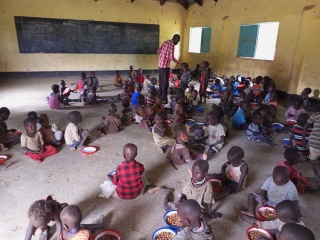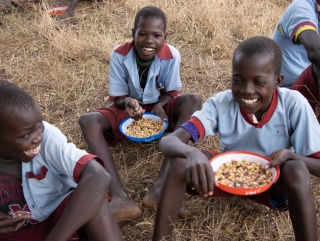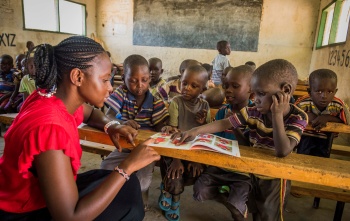
Meals of Hope as Famine Threatens Areas of Kenya
Mary’s Meals is now feeding an additional 60,000 children in drought-ravaged Turkana, northern Kenya.
Mary’s Meals served its first school meals in Turkana primary schools last month, reaching more than 60,000 children in 171 primary schools with daily meals of maize and beans with fortified oil.
The magnitude of serving school meals here is summed up in the phrase ‘no smoke, no school’; if there is no activity in school kitchens, children will not attend lessons. Many children are wholly reliant on school feeding to survive as the region is currently enduring severe drought after four consecutive failed rainy seasons resulting in crop failure and low yield harvests.
The coordinated efforts of Mary's Meals Kenya
The co-ordinated efforts to roll out an expansion of this scale are no mean feat for the Mary’s Meals Kenya team. Amina Swedi, Country Director of Mary’s Meals Kenya, explains that our presence in primary schools in Turkana is vital as, despite the Kenyan government’s best efforts, the current setup is inconsistent, and children are paying the price with their education.
She says: “At the moment, there is that inconsistency in feeding in primary schools and we have seen many children not coming to school and learning is not happening. I was speaking to a head teacher at a primary school and he said that they've not received food for almost a year. Enrolment in the school went from around 500 to 100 children. If there is no school feeding programme happening in primary school or any school, children don’t come.”
A lifeline for children
Since 2005, Mary’s Meals has been a lifeline for children in Turkana attending Early Childhood Development and Education centres (ECDEs), the earliest place of education for children. Given its scale, the rollout of the programme in primary schools has been a huge undertaking. Amina says the amount of food they need to secure is double what it was before (for the existing ECDE programme).
“The logistics side of it is going to be massive. I know that our procurement is going to double. Already we are feeding more than 91,000 learners in 675 pre-schools, so you can imagine adding 171 primary schools which are bigger than the pre-schools we’re currently in. I can't even wrap my brain around it!
“I think one thing that we should be confident of is our model which has worked in other countries like Malawi. We are confident with this massive expansion, but still, it's going to come with great complexities.”

Amina explains the impact of this work covers a range of ages – young children to teenagers who would otherwise be fending for themselves or helping their families – drawing learners into the classroom on a path to a brighter and more secure future.
“I know that once word goes around and children tell their friends and parents tell other parents that school feeding is happening, this enrolment is going to go up... and we will reach even more children, but even right now it’s still very impactful.
“I think our school feeding programme is going to help children from a very big range of age, from two years up to even 19 because education in Turkana now is not like education in other parts of Kenya. In Turkana, we have children as old as nine who go to ECDE as they've never had any education. Some might even be 15 years old and they feel like they're too big to be in ECDEs but when they find out that we are feeding in primary schools, they will come.”
A matter of life and death
Food will be the catalyst to change the story for children in Turkana, a place where food insecurity and malnutrition rates among children are some of the highest in the world and hunger is “a matter of life and death”, intrinsically linked with conflict.
She says: “Before I went to Turkana, I thought hunger was just having one meal a day. I've just come to appreciate that hunger in Turkana is totally different. Hunger in Turkana means conflict because once there is drought and there's no food, community members move in search of pasture for cattle, but also food for their children. It forces them to cross borders; people from Uganda, Ethiopia, South Sudan are in unstable conditions. It results in conflict.

“Right now, the global acute malnutrition rate is at 15%, but in Turkana it is much higher. When I see it [hunger] through the eyes of Turkana, it has given me a whole perspective about what hunger means. It’s not a matter of just missing one meal...it’s a matter of life and death.
“The biggest impact [of the programme] is going be happiness, the smiling! Children's faces, you’ll be able to see it. You will see hope on their faces once they start receiving this meal, and they see it's consistent. They have received this type of meal before, but it has not been consistent...we'll start seeing hope and smiles that are not fading away.”
Read more about our work in Kenya
Where Others Will Not Go

Communities serve up mugs of change in Kenya

World Food Day

We're now feeding more than 3 million children every school day.
But more than 71 million primary school-age children are out of school around the world. In order to survive, they have to work or beg. Even if they do make it into the classroom, hunger affects their ability to learn.
